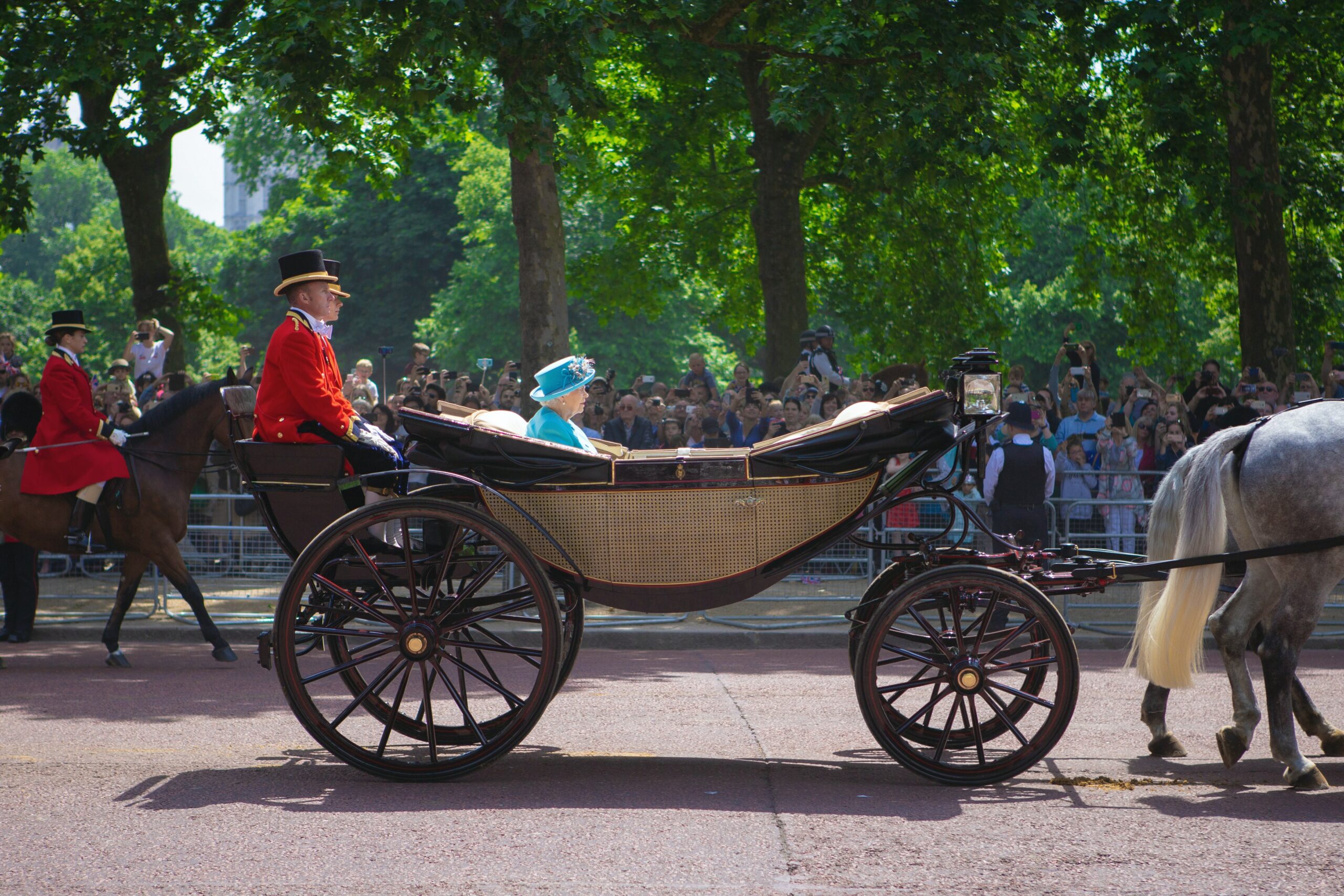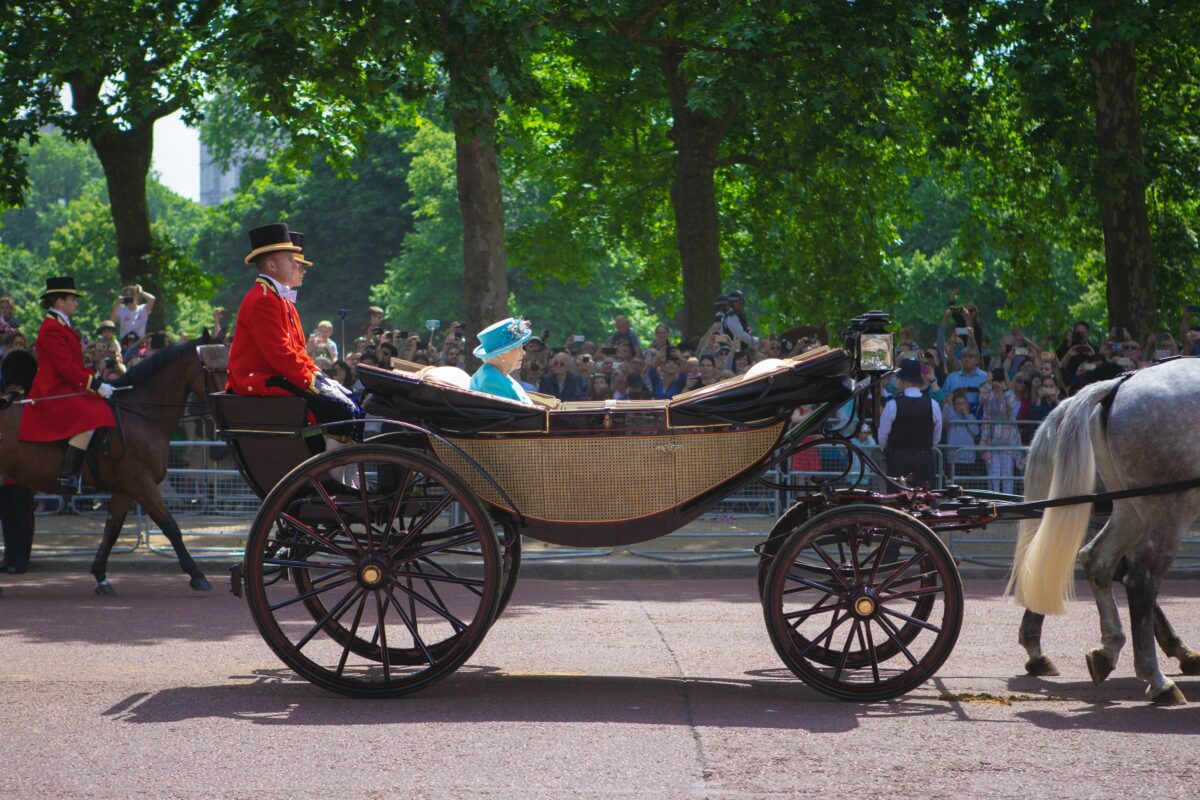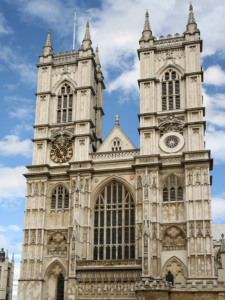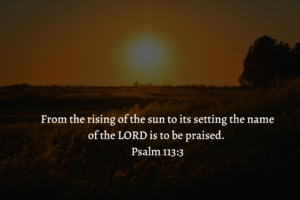
Photo by Mark de Jong on Unsplash
Co-missioners,
We send along some thoughts from our editor about Queen Elizabeth’s funeral ten days ago.
Peace and Joy,
The Crossings Community
__________________________________________________________________
“Their Sound is Gone Out into All Lands”
Reflections on the Queen’s Funeral
On September 19th the online version of the New York Times livestreamed the day-long solemnities of the funeral and burial of Queen Elizabeth II. It caught my eye at some point during the long procession from Westminster Abbey through central London to the place of departure for Windsor Castle, where the queen would be laid to rest. Exercising the newfound liberty of retirement, I clicked on the feed. I watched for a while, longer than I expected to. The British gift for pomp and circumstance is somehow mesmerizing, and all the more when you start to wonder what it takes to get all those thousands of people arrayed in all those immaculate historical uniforms, all marching in the slow and measured step of a nation in mourning. Obstacles loomed along the way. Not once did I spot a pair of feet breaking time or a body edging out of place as the procession flowed around them.
With organizational talents like these, it’s no wonder the Brits were able to govern much of the world for a few centuries—or so I thought as I watched. And perhaps that was the point of the grand display, or part of it, at least: a reminder to the rest of the world of glory that was and why it was. Here was the British Empire rising from its deathbed for one last bow as it said farewell to its last empress, that woman in her coffin lined with lead, a burden so heavy that the party of soldiers chosen to lift it at points along the way comprised eight bearers instead of the usual six. Soon after they hoisted it into place for the final time, we watched it sink through the floor of St. George’s Chapel to the crypt beneath. Dust she was, and to dust she is returning, the lead lining notwithstanding. So too the empire that was, its triumphs notwithstanding. Good riddance said many as they watched its last gasp—or so I imagined..
+ + +
So that was Monday the 19th. The next day, being still retired, I took a few more hours to watch recordings of the two events that bracketed the grand procession. The first was the funeral service in Westminster Abbey. The second was the committal service at Windsor Castle. I came away from both of these with my heart singing.
It sang because at both events I heard the Gospel of God proclaimed with a stunning and altogether unexpected clarity. Shame on me, I suppose, for not expecting this. Still, these are the days when all too many Christians, especially those of a progressively generous bent, seem quick to hide both who they are and Whose they are for fear of giving offense. A commencement service I suffered through at an ELCA university some twenty years ago comes quickly to mind. One might have thought that the Anglican prelates in charge of the queen’s funeral would have labored under similar compunctions for the sake of an audience largely detached from the Christian faith. They did not.
Instead they told quietly yet unabashedly of God’s word and promise in Christ Jesus as it applied that day not only to the dead queen and her immediate family, but also to everyone else who happened to be listening in, no matter who or where they were in the world. This Gospel came through from start to finish, in word and song and prayer, through gesture and intonation. It was passed along with a wondrous combination of simplicity, humility, and beauty. Those who delivered it did so with unmistakable conviction. They didn’t scold, wheedle, harangue, or try to convince. They simply spoke or sang it as it is in Christ—as, in keeping with the apostles Paul and John from whom they took their lead, they knew and trusted it to be. With that they left it for others to take or leave as they saw fit. I’d like to think that at least some of those others, prompted by the Holy Spirit, felt invited to take, or if nothing else to look a little further into this Jesus thing they were hearing about.
Here are a few things in particular that caught my ear and sparked some thought as the services unfolded:
1. The Archbishop of Canterbury’s brief sermon, the best I’ve ever heard at a funeral:
Attentive to his audience, the Most Reverend Justin Welby kept his remarks to no more than five or six minutes. Rarely has more been said in fewer words in so public a venue. Lincoln’s Gettysburg and Second Inaugural Addresses are the only rivals that come to mind.
In these minutes the archbishop managed to summarize what made this queen so special to her nation and the world—the New York Times picked up on that, though nothing more. He also consoled her family and acknowledged the grief of countless others looking on who had suffered similar losses in recent days. Above all he thanked and praised God for the person Elizabeth was and forever will be through her faith in Christ. To that One goes the credit, he said, for the lifelong example of steadfast service that so endeared the queen to her subjects. Or in his own words: “Jesus, who in our reading (John 14:1ff.) does not tell his disciples how to follow but who to follow, said ‘I am the way, the truth, and the life.’ Her late Majesty’s example was not set through her position or her ambition, but through Whom she followed.” And a bit later: “Her service to so many people…had its foundation in her following Christ, God Himself, who said that he came not to be served, but to serve, and to give his life as a ransom for many.” Came then a succinct summation of Elizabeth’s hope in God as one for every hearer to share: “Christ rose from the dead and offers life for all”—the promise set forth in plain, direct words without the faintest trace of brow-beating or know-it-all superiority in the preacher’s voice.
It was altogether a sermon that merits thoughtful study by other Christian preachers whose funeral audiences are bound these days to include people unfamiliar with the Gospel or even hostile to it. Archbishop Welby has much to teach them. The sermon also bears devotional rehearing by whoever is so inclined. I hope it gets this. I, for one, thank God for it.
2. The hymns, picked in advance by the queen herself, or so we were told:
There were three of these at the funeral, all from the Anglican tradition. The first was the lovely evening hymn, “The Day Thou Gavest, Lord, is Ended”—in American Lutheran books, LBW 274, ELW 569, LSB 886. Its final stanza was especially apt:
So be it, Lord; thy throne shall never
Like earth’s proud empires pass away;
Thy kingdom stands and grows forever;
Till all thy creatures own thy sway.
Good news indeed when the Lord in question is the One the archbishop would soon speak of in his preaching. Better news still when you stepped from the abbey into that wistful display of bygone imperial glory. Blessed be Elizabeth for so reminding her subjects of far better things to come by the grace and mercy of God. She did this too through the prayerful closing stanza of the third hymn, Charles Wesley’s “Love Divine, All Loves Excelling”—
Finish then thy new creation,
pure and spotless let us be;
let us see thy great salvation,
perfectly restored in thee,
changed from glory into glory
till in heaven we take our place,
till we cast our crowns before thee,
lost in wonder, love, and praise!
Lost we were as the boy sopranos lofted this faith and promise on their soaring descant.
3. The prayers:
Many of these came from the Book of Common Prayer. Others were crafted for the occasion in the pattern of the classic Anglican collect. Almost all were offered “…through Jesus Christ our Lord” as Christians are wont to do. The service bulletin listed leaders of several other religious traditions who were present for the occasion. I assume they listened with thoughtful respect as indeed a decent Christian would were he or she invited to a Muslim service, say. (Yes, God save us all from Christian indecency of which there’s far too much and always has been.) Respect is the least we can expect of each other across religious boundaries. We can also expect mutual honesty about who we are and how we understand the god or gods we talk to when we pray. Such honesty was a hallmark of this funeral. So too was lovely language. The prayers sparkled with this. None did so more than one composed by John Donne. I had not encountered it before. The service planners—the queen herself, perhaps—found it so compelling that it was repeated in a musical setting at the later committal. Here it is—
“Bring us, O Lord God, at our last awakening into the house and gate of heaven, to enter into that gate and dwell in that house, where there shall be no darkness nor dazzling, but one equal light; no noise nor silence, but one equal music; no fears nor hopes, but one equal possession; no ends nor beginnings, but one equal eternity; in the habitation of thy glory and dominion, world without end.”
Amen indeed.
Three quick final thoughts, plucked from the abundance of others I’ll forgo for the sake of present space and time and patience—
First: how marvelous it was to find this entire day-long event bracketed in the Word of God that brings the mighty down from their thrones and exalts the lowly. Nothing from God that was said or sung about Elizabeth could not have applied in equal measure—see Donne above—to the lowliest pauper in one of her erstwhile colonial dominions. At the end of the day God gave us, we all sink beneath the floor in one way or another. And in that sinking we all encounter the gracious One who, in his abhorrence of sin and death, sank lower than anyone to break its grip on the rest of us. Such was the day’s overarching message. It was wonderfully underscored in the Bidding that opened the committal service, in which she, hitherto described as Her Majesty the Queen, was now described as “our sister Elizabeth.” I hope some paupers caught that. On equal footing they were with the one who had just gotten that extravagant parade.
Second: threaded through and through the services was a message that faith in Christ matters now, in this present life; that it has the power to form and shape a person, not least the longest-reigning queen of England. “We got who we got because she knew who to trust and follow and did just that.” Thus the archbishop in Westminster Abbey and later the dean in St. George’s chapel. “Good works are to faith as heat and light are to fire.” Thus Luther. I hope lots of Christian caught that, paupers and potentates alike.
Third: I entitled this piece with a line from the libretto of Handel’s Messiah, the quote from Psalm 19 that Paul picks up in Romans 10: “Their sound is gone out into all lands.” It’s preceded in Handel’s work by a quote from Isaiah 52, also picked up in Romans 10: “How beautiful are the feet of them that preach the gospel of peace, and bring glad tidings of good things.” Be it said that the feet of the archbishop and his colleagues and the choristers and all others involved in the services of September 19th were beautiful indeed. And yes, their sound—the gospel of peace—went out that day into all lands, “and their words unto the ends of the world.” That’s what happened. It’s on the record. For that, let’s all thank God.
As to what came of it, we leave this in the Holy Spirit’s hands where it belongs. Ours is merely to proclaim as graciously and winsomely as we can—as you’ll hear and see it done if you take the time to tune in to those services. For links, see above in the first paragraph of the second section. If nothing else, check out the bulletins for both the funeral and the committal. I found them at The Guardian. There’s no saying, of course, how long they’ll stay there.
Jerome Burce
Roaming Shores, Ohio
Thursday Theology: that the benefits of Christ be put to use
A publication of the Crossings Community






You must be logged in to post a comment.